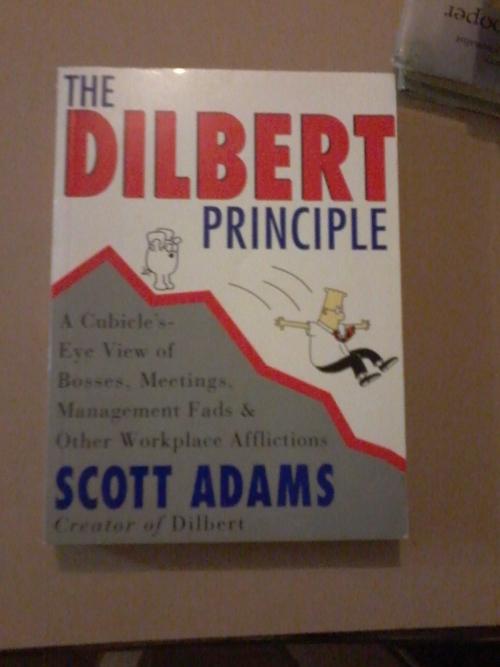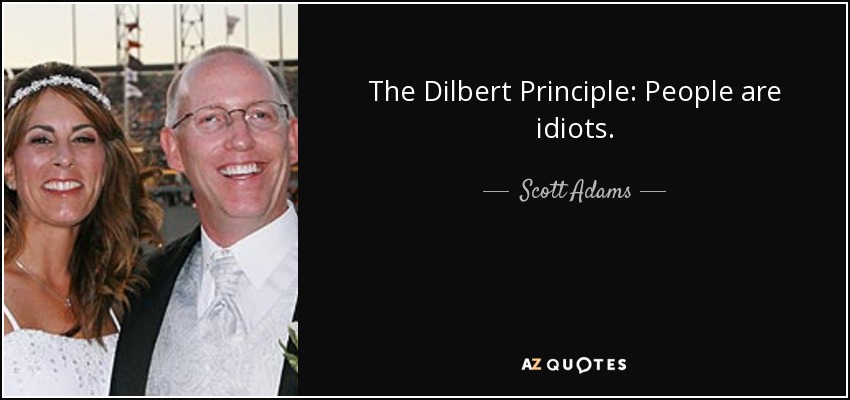Scott Adams The Dilbert Principle Download Movies
- Scott Adams The Dilbert Principle Download Movies Free
- Scott Adams The Dilbert Principle
- Dilbert Management Principles
The Dilbert Principle, by Scott Adams Reviewed by Suzanne S. Barnhill Fairhope Public Library • November 26, 1996 [Hold up Dilbert drawing. Books (over 750,000 of The Dilbert Principle alone) and recently published another book, Dogbert’s Top Secret Management Handbook.
Overview (2)
| Born | in Windham, New York, USA |
| Birth Name | Scott Raymond Adams |
Mini Bio (1)
Scott Adams, frustrated with the inanities of corporate America and its idiot bosses, created the comic strip 'Dilbert' to lampoon all he considered repugnant-yet-funny in the workplace of cubicles. His title character Dilbert, the bespectacled MIT graduate with no mouth and flip-up tie, is part alter ego, part 'every man.' Dilbert was embraced by the comic-strip-reading public in 1989, and as of 2001, appeared through United Media's syndication efforts in an impressive 2,000 newspapers in 50-plus countries translated in 19 languages. Born on June 8, 1957, Adams was raised in Windham, New York, and as a youngster, he tried his hand at cartooning. He entered art contests with little success. He was chosen valedictorian of his high school class (he claimed it was because 'the other 39 people in my class couldn't spell valedictorian'). From 1979 to 1986, he worked at a San Francisco bank in a variety of dead-end jobs (as a bank teller, he was held at gunpoint twice), then worked at Pacific Bell from 1986 to June 1995, mostly in various engineering groups. Inspired from Adams' idle doodlings during dull company meetings, nerdy Dilbert embodied many characteristics of his co-workers. Adams kept his day job at Pacific Bell for 8 years after the comic strip was launched, partly for financial security and partly for relevant material. He was finally asked to leave by a new boss because of 'budget constraints.' Adams' education was not in art or engineering; he earned a bachelor's degree in economics from Hartwick College in Oneonta, New York, then earned an MBA from the University of California at Berkeley in 1986. Adams is credited with being the first cartoonist to print his e-mail address in his comic strip and dilbert.com was the first syndicated comic strip to go online in 1995. As of 2001, it was the most widely read syndicated comic on the Internet. Adams has also successfully launched a full repertoire of Dilbert-emblazoned products from desk calendars to T-shirts; a Dilbert Web site; a short-lived animated TV show in 1999; and his own line of food products, including the 'Dilberito,' a frozen vegetarian burrito. Adams' many best-selling Dilbert books include 'Build a Better Life by Stealing Office Supplies'; 'The Dilbert Future'; 'I'm Not Anti-Business, I'm Anti-Idiot'; 'Journey to Cubeville'; and 'Random Acts of Management.' Adams is an irreverent member of Mensa.
- IMDb Mini Biography By: Vicki McClure Davidson
Spouse (1)
| Shelly Miles | (22 July 2006 - 2014) |
Trivia (4)
Personal Quotes (13)



The Dilbert principle is a concept in management developed by Scott Adams, creator of the comic strip Dilbert, which states that companies tend to systematically promote incompetent employees to management to get them out of the workflow. The Dilbert principle is inspired by the Peter principle, which holds that employees are promoted based on success in their current position until they reach their 'level of incompetence' and are no longer promoted. Under the Dilbert principle, employees who were never competent are promoted to management to limit the damage they can do. Adams first explained the principle in a 1995 Wall Street Journal article, and expanded upon it in his 1996 business book The Dilbert Principle.
Definition[edit]
In the Dilbert strip of February 5, 1995, Dogbert says that 'leadership is nature's way of removing morons from the productive flow'. Adams himself explained,[1]
Scott Adams The Dilbert Principle Download Movies Free
I wrote The Dilbert Principle around the concept that in many cases the least competent, least smart people are promoted, simply because they’re the ones you don't want doing actual work. You want them ordering the doughnuts and yelling at people for not doing their assignments—you know, the easy work. Your heart surgeons and your computer programmers—your smart people—aren't in management. That principle was literally happening everywhere.
Adams explained the principle in a 1995 Wall Street Journal article.[2] Adams then expanded his study of the Dilbert principle in his 1996 book The Dilbert Principle, which is required or recommended reading at some management and business programs.[3][4][5][6] In the book, Adams writes that, in terms of effectiveness, use of the Dilbert principle is akin to a band of gorillas choosing an alpha-squirrel to lead them. The book has sold more than a million copies and was on the New York Times bestseller list for 43 weeks.
Adams' presentation of the principle is satirical—facetious but also addressing a real-world concern.
Scott Adams The Dilbert Principle
Comparative principles[edit]
The Dilbert principle is comparable to the Peter principle. As opposed to the Dilbert principle, the Peter principle assumes that people are promoted because they are competent, and that the tasks higher up in the hierarchy require skills or talents they do not possess. It concludes that due to this, a competent employee will eventually be promoted to, and then remain at, a position at which he or she is incompetent. In his book, The Peter Principle, Laurence J. Peter explains 'percussive sublimation', the act of kicking a person upstairs (i.e., promoting him to management) to get him out of the way of productive employees.
The Dilbert principle, by contrast, assumes that hierarchy just serves as a means for removing the incompetent to 'higher' positions where they will be unable to cause damage to the workflow, assuming that the upper echelons of an organization have little relevance to its actual production, and that the majority of real, productive work in a company is done by people lower in the power ladder. Unlike the Peter principle, the promoted individuals were not particularly good at any job they previously held, so placing them in a supervisory position is a way to quietly remove them from the workforce without actually firing them, rather than a reward for meritorious service. An earlier formulation of this effect was known as Putt's Law.
See also[edit]
- Negative selection (politics) – Aversion to the success of one's subordinates
References[edit]
Dilbert Management Principles
- ^'Funny Business'(PDF). BizEd. November–December 2002. Archived from the original(PDF) on February 6, 2009. Retrieved April 23, 2011.
- ^Adams, Scott. 'Manager's journal: The Dilbert principle.' Wall Street Journal [New York, N.Y.] 22 May 1995, Eastern edition: A12. Wall Street Journal.
- ^'Project Management Case Studies'(PDF). Haas School of Business. University of California, Berkeley. 2003. Archived from the original(PDF) on March 13, 2012. Retrieved October 17, 2015.
- ^'Readings for CSCI 3308 - Software Engineering Methods and Tools'. University of Colorado Boulder. March 16, 2001. Archived from the original on September 22, 2006. Retrieved October 17, 2015.
- ^'Syllabus - SW Project Mgt - CSE5315 - 1998'. Archived from the original on February 20, 2003. Retrieved 2010-02-09.
- ^'EM 501 Management of Organizations'. Washington State University. 2000. Archived from the original on February 9, 2010. Retrieved October 17, 2015.
Further reading[edit]
- The Dilbert Principle by Scott Adams, HarperBusiness (1996) ISBN0-88730-858-9.